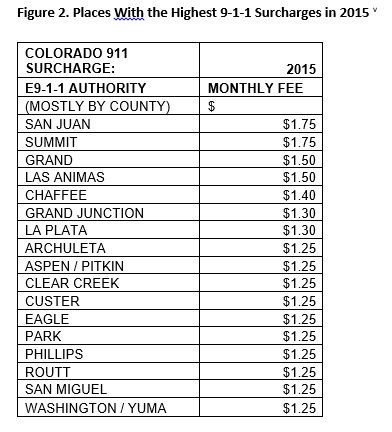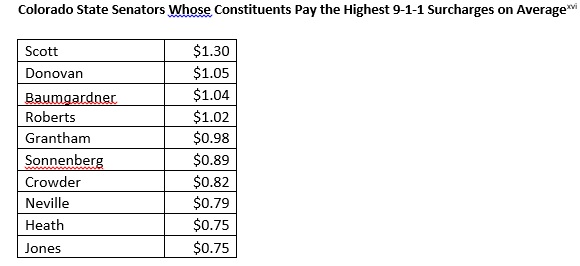Danny Katz
Executive Director, CoPIRG
Executive Director, CoPIRG
On the day a State Senate committee considers a bill to stop Colorado’s consumer watchdog from reviewing the 9-1-1 fees charged to Coloradans each month on their telephone bills, a new report highlights how some Colorado residents fees are four times higher than others. According to the report by CoPIRG, 9-1-1 surcharges on customer telephone bills, which fund a patchwork of local communities’ 9-1-1 services like Call Centers, have grown by 44% since 1998 and residents in Summit County and San Juan County in Colorado pay the highest fees.
“For years Coloradans have had an effective consumer watchdog whose sole mission is to advocate for consumers,” said Danny Katz, Director of the consumer advocacy group CoPIRG. “As 9-1-1 fees rise, the last thing we need is for our consumer advocate to get disconnected by the State Senate.”
In order to fund 9-1-1 service across Colorado, every individual and business with a phone pays a 9-1-1 monthly surcharge on their phone bill, whether they have one of the estimated 1.1 million traditional landline phones in Colorado or they use one of the 5.1 million cell phones or 800,000 cable telephone devices. Some phone companies break this fee out as a separate line item on a customer’s monthly bill.
The 9-1-1 fee charged to Coloradans varies widely across the state based on customer’s billing address. The lowest charge is $.43 per month for residents of Arapahoe County and the highest is $1.75 per month for residents of Summit County and San Juan County. The surcharge is set by one of 57 local governing bodies that use the funding to ensure that when you call 9-1-1, your call is answered and you receive the potentially life-saving service you need.
According to the new report, the residents who pay the highest 9-1-1 surcharges live in the following parts of Colorado:

According to CoPIRG’s analysis, 9-1-1 surcharges are likely to increase over the next decade. Historically, the average 9-1-1 surcharge has grown 44% since 1998. In addition, major technological advances will allow important upgrades to 9-1-1 services including:
“Technology offers some exciting opportunities to increase the effectiveness of our life-saving 9-1-1 system,” said Katz. “But many of these upgrades will cost money and we know not all that glitters is gold. Any upgrade must be cost effective and provide value to the Coloradans who are footing the bill. Our consumer advocate has an important role to play to ensure costs are justified and warranted.”
State law requires that any 9-1-1 governing body that proposes a fee over $.70 must seek approval for that increase from Colorado’s Public Utilities Commission (PUC). Currently 53 of the 57 governing bodies’ 9-1-1 surcharges are at or above that threshold. During PUC proceedings, the Office of Consumer Counsel (OCC) is the entity charged with representing solely the interests of consumers.
“Proposals will be coming to the PUC to raise the 9-1-1 fees charged to consumers,” said Katz. “For 30 years, Colorado’s Consumer Advocate, the OCC, has asked the tough questions to ensure that consumers are getting the value and service they deserve from our 9-1-1 system. They have the expertise and the experience. It doesn’t make sense to disconnect them from reviewing 9-1-1 fees.”
CoPIRG’s report was released the day the State Senate Committee on Business, Labor and Technology is scheduled to hear a bill that would cut the Office of Consumer Counsel’s ability to watchdog 9-1-1 fee increase proposals. The bill, SB15-271, is sponsored by Senator Jerry Sonnenberg.
To demonstrate the impact on individual Senator’s constituents, CoPIRG’s report ranked which Senator’s constituents paid the highest 9-1-1 fee on average.

“The Office of Consumer Counsel’s job is to advocate for consumers. No one else,” said Katz. “Voting to disconnect them, when we know 9-1-1 fees will increase, indicates that the consumer’s voice is not important even though they are the ones footing the bill.”
On Monday, Governor John Hickenlooper announced his support for keeping the Office of Consumer Counsel (OCC) connected on telecom issues. Separately, Representatives Winter and Esgar introduced a bill, HB15-1381, which also retains the OCC’s ability to advocate for consumers on telephone issues before the PUC. The Legislature has until May 6th to pass a bill reauthorizing the OCC.
The full CoPIRG report can be found here.